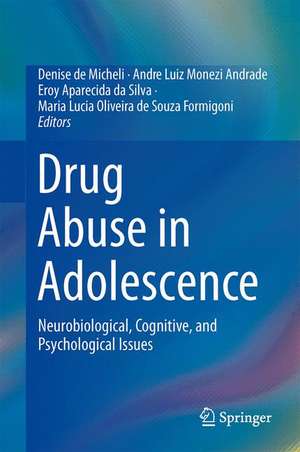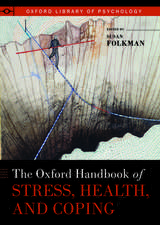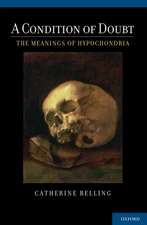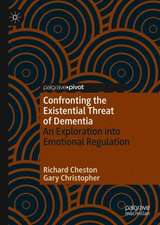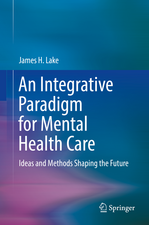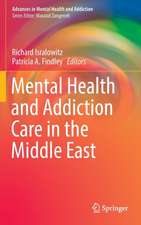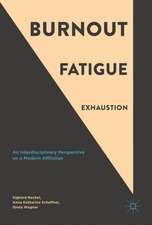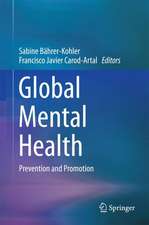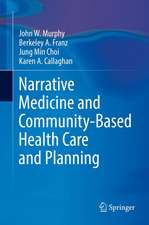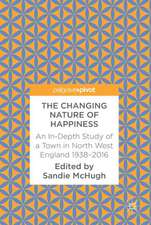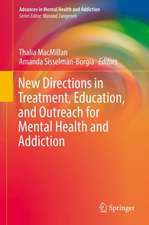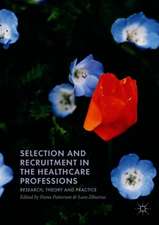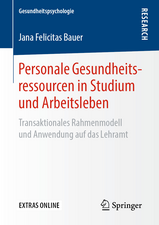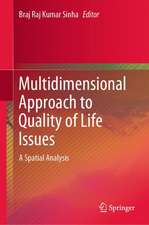Drug Abuse in Adolescence: Neurobiological, Cognitive, and Psychological Issues
Editat de Denise De Micheli, André Luiz Monezi Andrade, Eroy Aparecida da Silva, Maria Lucia Oliveira de Souza Formigonien Limba Engleză Hardback – 15 iul 2015
Throughout, the contributors make clear that education is more valuable to understanding--and preventing--substance abuse than are prohibition and zero-tolerance thinking.
Included among the topics:
- Cognitive development, learning, and drug use.
- Neurobiology of the action of drugs of abuse.
- Findings in adolescents with substance dependence based on neuroimaging tests.
- Alcohol abuse in adolescents: relevance of animal models.
- Effects of chronic drug abuse on the chronobiology of sleep in adolescents.
- Neurological and cognitive disorders arising from the chronic use of drugs of abuse.
| Toate formatele și edițiile | Preț | Express |
|---|---|---|
| Paperback (1) | 711.88 lei 6-8 săpt. | |
| Springer International Publishing – 15 oct 2016 | 711.88 lei 6-8 săpt. | |
| Hardback (1) | 718.82 lei 6-8 săpt. | |
| Springer International Publishing – 15 iul 2015 | 718.82 lei 6-8 săpt. |
Preț: 718.82 lei
Preț vechi: 756.65 lei
-5% Nou
Puncte Express: 1078
Preț estimativ în valută:
137.56€ • 143.09$ • 113.57£
137.56€ • 143.09$ • 113.57£
Carte tipărită la comandă
Livrare economică 15-29 aprilie
Preluare comenzi: 021 569.72.76
Specificații
ISBN-13: 9783319177946
ISBN-10: 331917794X
Pagini: 230
Ilustrații: XXIII, 200 p. 40 illus., 13 illus. in color.
Dimensiuni: 155 x 235 x 20 mm
Greutate: 0.49 kg
Ediția:1st ed. 2016
Editura: Springer International Publishing
Colecția Springer
Locul publicării:Cham, Switzerland
ISBN-10: 331917794X
Pagini: 230
Ilustrații: XXIII, 200 p. 40 illus., 13 illus. in color.
Dimensiuni: 155 x 235 x 20 mm
Greutate: 0.49 kg
Ediția:1st ed. 2016
Editura: Springer International Publishing
Colecția Springer
Locul publicării:Cham, Switzerland
Public țintă
ResearchCuprins
Neural-hormonal system in adolescence. - Cognitive development and substance misuse. - Neurodevelopment during adolescence. - Neural basis of drug addiction. - Neurobiological effects of different types of drug abuse on adolescent brain. - Neuroimaging of the human brain in adolescent substance users. - Animal models of adolescent drug abuse. - Functional magnetic resonance imaging studies of the adolescent reward system: the triadic model perspective. - Chronic effects of drug abuse on sleep and chronibiology in adolescents. - Neurocognitive changes due to chronic adolescents' substance misuse. - Relationship between mood disorders and substance abuse in adolescents. - Substance abuse and ADHD in adolescents. - Future directions for research
Recenzii
“The purpose is to elucidate the interaction ofchemical dependence in adolescence in relationship to normal developmental,hormonal, and neurocognitive changes. … it can be useful to clinicians inhelping increase their understanding of these problems in adolescence andenabling them to more effectively treat this population. … This is a detailed,highly technical book presenting up-to-date research in this area.” (MichaelEaston, Doody’s Book Reviews, December, 2015)
“This text reviews research on adolescents and drugabuse from the perspective of developmental neuroscience. … The text provides auseful summary for researchers interested in neurodevelopment and substanceabuse by adolescents. … The text would be of interest to neuroscienceprofessionals, but especially those who employ the latest imaging techniques intheir own research. … For prevention and treatment professionals, the text willopen eyes and stimulate thinking about traditional prevention and treatmentpolicies and methods.” (James M. Topolski, PsycCRITIQUES, Vol. 60 (52),December, 2015)
“This text reviews research on adolescents and drugabuse from the perspective of developmental neuroscience. … The text provides auseful summary for researchers interested in neurodevelopment and substanceabuse by adolescents. … The text would be of interest to neuroscienceprofessionals, but especially those who employ the latest imaging techniques intheir own research. … For prevention and treatment professionals, the text willopen eyes and stimulate thinking about traditional prevention and treatmentpolicies and methods.” (James M. Topolski, PsycCRITIQUES, Vol. 60 (52),December, 2015)
Notă biografică
Denise De Micheli obtained a bachelor's degree in psychology at Universidade Paulista and masters and doctoral degrees at the Universidade Federal de São Paulo. A professor in the Department of Psychobiology at Universidade Federal de São Paulo, she also serves as chief of the Interdisciplinary Centre of Studies in Neuroscience Adolescent Health and Education and is a member of the Association for Medical Education and Research in Substance Abuse.
André Luiz Monezi Andrade obtained a bachelors degree in psychology at Universidade Positivo and a masters degree at Universidade Federal de São Paulo, and currently is finishing his doctoral studies at Universidade Federal de São Paulo focusing on neurobiology of addiction in adolescence. He is a professor in the Department of Psychology at Universidade Anhembi Morumbi with special focus on psychopathology and psychopharmacology in adolescents.
Eroy Apericida da Silva obtained a bachelors degree in psychology by UniversidadePaulistana and masters and doctoral degrees at the Universidade Federal de São Paulo. He is a professor in the Department of Psychology at the Universidade Federal de São Paulo, where he also serves as Chief of Cognitive Therapies on Substance Abuse at Unidade de Dependência de Drogas (UDED).
Maria Lucia Oliveira de Souza Formigoni obtained a bachelors degree in medical biological sciences from Escola Paulista de Medicina (EPM), Universidade Federal de São Paulo (UNIFESP) in 1979, where she also completed her masters and doctoral studies in psychopharmacology and psychobiology, respectively. She is an associate professor and the prorector of post-graduate studies and research of the Universidade Federal de São Paulo.
André Luiz Monezi Andrade obtained a bachelors degree in psychology at Universidade Positivo and a masters degree at Universidade Federal de São Paulo, and currently is finishing his doctoral studies at Universidade Federal de São Paulo focusing on neurobiology of addiction in adolescence. He is a professor in the Department of Psychology at Universidade Anhembi Morumbi with special focus on psychopathology and psychopharmacology in adolescents.
Eroy Apericida da Silva obtained a bachelors degree in psychology by UniversidadePaulistana and masters and doctoral degrees at the Universidade Federal de São Paulo. He is a professor in the Department of Psychology at the Universidade Federal de São Paulo, where he also serves as Chief of Cognitive Therapies on Substance Abuse at Unidade de Dependência de Drogas (UDED).
Maria Lucia Oliveira de Souza Formigoni obtained a bachelors degree in medical biological sciences from Escola Paulista de Medicina (EPM), Universidade Federal de São Paulo (UNIFESP) in 1979, where she also completed her masters and doctoral studies in psychopharmacology and psychobiology, respectively. She is an associate professor and the prorector of post-graduate studies and research of the Universidade Federal de São Paulo.
Textul de pe ultima copertă
Focusing on two central themes--the psychobiological evolution from youth to adult and the effects of drugs on the developing central nervous system--this important reference elucidates the mechanisms of chemical dependency in adolescents. Its multidisciplinary coverage analyzes addiction across major domains of human functioning against the backdrop of hormonal, cognitive, and other changes that accompany the transition to adulthood. Chapters discuss legal as well as illicit drugs, examine age-related social contexts, and present the latest findings on links between drug use and mental disorders.
Throughout, the contributors make clear that education is more valuable to understanding--and preventing--substance abuse than are prohibition and zero-tolerance thinking.
Included among the topics:
The multiple lenses for understanding its subject and the sensitivity with which causal nuances are treated make Neuroscience of Drug Abuse in Adolescence an invaluable resource for clinical and child psychologists, psychiatrists, social workers, and addiction counselors.
Throughout, the contributors make clear that education is more valuable to understanding--and preventing--substance abuse than are prohibition and zero-tolerance thinking.
Included among the topics:
- Cognitive development, learning, and drug use.
- Neurobiology of the action of drugs of abuse.
- Findings in adolescents with substance dependence based on neuroimaging tests.
- Alcohol abuse in adolescents: relevance of animal models.
- Effects of chronic drug abuse on the chronobiology of sleep in adolescents.
- Neurological and cognitive disorders arising from the chronic use of drugs of abuse.
The multiple lenses for understanding its subject and the sensitivity with which causal nuances are treated make Neuroscience of Drug Abuse in Adolescence an invaluable resource for clinical and child psychologists, psychiatrists, social workers, and addiction counselors.
Caracteristici
Connects substance abuse with the most prevalent psychiatric comorbidities during adolescence Contrasts reward neurocircuitry and drug effects in adolescents with those in adults Reviews neurobiological, cognitive, and psychological aspects of drug abuse and addiction in adolescents Includes supplementary material: sn.pub/extras
